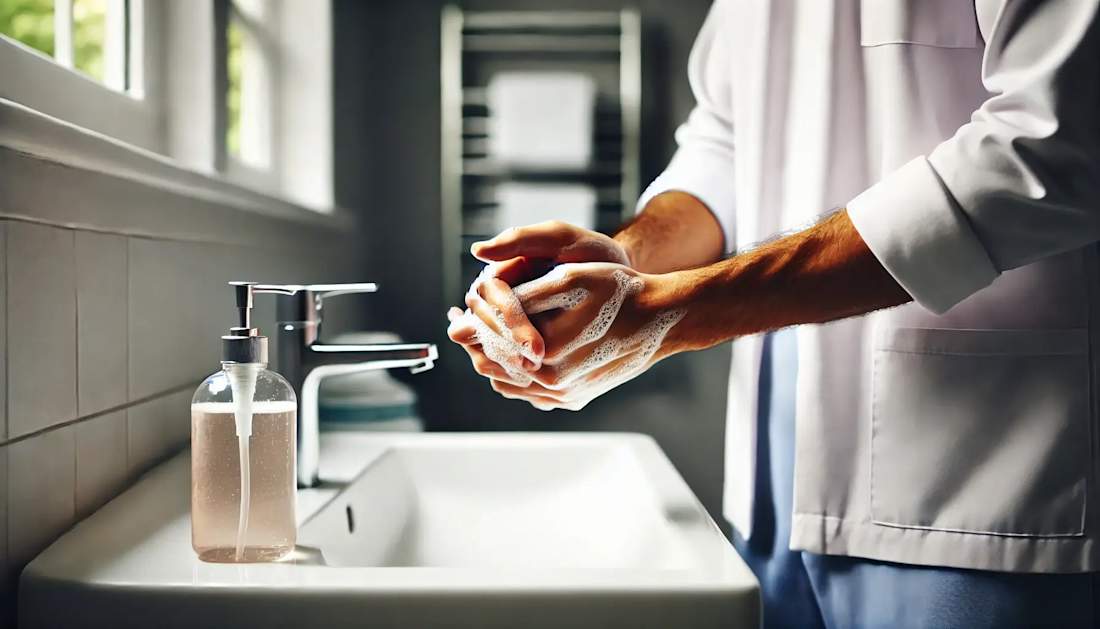How Surgical Soap Helps Prevent Infections Before Surgery


Surgical Soap: Your First Step to a Safe Surgery
Before surgery, keeping your skin clean is a must. Regular soap won’t remove all the bacteria and germs that could cause infections. That’s where surgical soap comes in. It’s made to kill harmful microbes and lower the risk of complications. Using it the right way helps protect your health and leads to a smoother recovery.
Infections are one of the most common complications following surgery, but using an antiseptic soap helps in preventing bacteria from entering your body during the procedure.
What Is Surgical Soap?

Surgical soap is an antimicrobial cleansing agent specifically designed to reduce the number of germs on your skin. Unlike regular soap, which cleans surface dirt and oil, surgical soap contains ingredients such as chlorhexidine gluconate or povidone-iodine that are scientifically proven to kill a wide range of harmful microorganisms. These ingredients ensure that your skin is as clean as possible prior to surgery, which is essential for minimizing the risk of infection.
The key ingredients in surgical soap play a key role in its effectiveness. Chlorhexidine gluconate, for example, is known for its long-lasting antimicrobial properties that help keep the skin free of germs for a prolonged period. Povidone-iodine, another commonly used ingredient, has broad-spectrum antiseptic properties. This makes surgical soap distinctly more effective compared to regular body washes, which do not have the same germ-fighting capabilities.
Regular soap simply cannot compare to surgical soap when it comes to pre-surgical preparation. While regular soap is great for everyday hygiene, it lacks the targeted antimicrobial action needed to protect against surgical site infections. Surgical soap has been specifically formulated for this purpose, ensuring a deeper clean that is required before undergoing a medical procedure.
Why Is Surgical Soap Important Before Surgery?

The primary role of surgical soap is to prevent surgical site infections (SSIs), which are a significant cause of post-surgical complications. SSIs can lead to prolonged hospital stays, additional treatments, and even serious health risks. By using surgical soap before your procedure, you are taking an active step to minimize this risk and increase the likelihood of a successful surgery with fewer complications.
Another benefit of using surgical soap is that it allows for a more effective pre-surgery preparation process. When the skin is properly cleansed, the chances of harmful bacteria entering the surgical incision are significantly lowered. This can help improve wound healing and reduce the risk of needing antibiotics after surgery. In other words, surgical soap helps ensure that your skin is properly prepared, which directly impacts the outcome of the procedure.
How to Use Surgical Soap Effectively

The timing of when you use surgical soap is very important. Generally, healthcare providers recommend that you shower with surgical soap both the night before and the morning of your surgery. This ensures that any bacteria that may have accumulated overnight are removed, reducing the risk of infection as much as possible.
When applying surgical soap, use a clean washcloth or your hands to thoroughly cleanse your entire body, paying particular attention to the area around the surgical site. Be sure to follow the instructions provided by your healthcare team, as they may have specific guidelines depending on the type of surgery you are undergoing. Thorough application ensures that the maximum amount of bacteria is removed from your skin.
It is important to avoid getting surgical soap in sensitive areas such as your eyes, ears, mouth, and any mucous membranes, as it can cause irritation. Focusing on cleaning the body while being cautious around these areas will help make the process more comfortable and effective. Following these precautions ensures that you are getting the benefits of the soap without unwanted side effects.
After applying surgical soap, it is important to rinse it off completely. Leaving any residue on the skin could potentially lead to irritation. Take your time rinsing to make sure all the soap is removed. This will help prevent any skin issues and ensure that you are fully prepared for surgery.
Tips for a Better Experience
It is recommended to follow all instructions given by your healthcare provider when using surgical soap. These instructions are provided to maximize the effectiveness of the soap, and following them closely will help you get the best possible outcome from your surgery. Your healthcare team knows what is best for your specific situation, so adhering to their guidance is critical.
Using fresh towels after showering with surgical soap is another important tip. Clean towels help avoid reintroducing bacteria that may still be lingering on previously used towels. Make sure your towels are freshly laundered, as this is another simple yet effective way to keep your skin as germ-free as possible before surgery.
Avoid applying lotions, creams, or perfumes after using surgical soap, as these products can interfere with the antiseptic action of the soap. The chemicals in lotions or fragrances may also irritate your skin before surgery, which could complicate the procedure. Keeping your skin clean and product-free is the best approach.
Common Mistakes to Avoid When Using Surgical Soap

One common mistake is not allowing enough time for the surgical soap to work effectively. It's important to lather the soap on your skin for the recommended time, usually around three to five minutes, before rinsing. This contact time allows the antimicrobial ingredients to properly kill the bacteria present on your skin. Rushing through the process can leave harmful germs behind, increasing the risk of post-operative infection.
Another frequent mistake is neglecting certain parts of the body. While the area around the surgical site is the primary focus, it is essential to clean your entire body thoroughly. Bacteria can travel from different areas of your skin and still pose a risk. Making sure all parts of the body are cleansed ensures that the bacterial load is minimized, enhancing overall surgical safety.
Additionally, many patients forget to avoid hair removal immediately before using surgical soap. Shaving or waxing can cause micro-abrasions on the skin, which increases the risk of infection. It is best to avoid any form of hair removal for at least 48 hours before surgery, unless your doctor has given you specific instructions otherwise. If hair removal is required, they will provide safe alternatives or guide you on the correct timing.
What to Do After Using Surgical Soap
After using surgical soap, make sure to dry your skin using a freshly laundered towel. It's important to avoid re-contaminating your skin, so using a clean towel will help maintain the cleanliness achieved by the soap. Once you are dry, put on freshly washed clothes or hospital-provided garments to further minimize any risk of reintroducing bacteria.
You should also be careful to avoid contact with pets or other potentially unclean surfaces after using surgical soap. Touching your pets or lying down on unclean bedding can undo the benefits of your preparation. To optimize the effectiveness of your pre-surgical wash, maintain a clean environment until your procedure.
Finally, make sure to have all your necessary items prepared for the day of your surgery. This includes any prescribed medications, paperwork, and loose, comfortable clothing. Being organized and minimizing stress can contribute to a smoother surgical experience and recovery.
Where to Get Surgical Soap and Common Questions
Surgical soap is available both over the counter and by prescription, depending on the specific type recommended by your healthcare provider. Most commonly, you can find surgical soap at major pharmacies, medical supply stores, or online. Popular over-the-counter brands include Hibiclens (which contains chlorhexidine gluconate) and Betadine (which contains povidone-iodine). These brands are known for their effectiveness and are frequently recommended by doctors.
Surgical soap usually has an antiseptic or medical scent, which some people may find strong. However, the smell is part of what makes it effective, as the active ingredients are designed to eliminate bacteria. It typically comes in liquid form, although there are also bar versions available for those who prefer a solid soap. Regardless of the form, both versions are equally effective when used correctly.
If you find yourself with leftover surgical soap after your procedure, there is generally no harm in continuing to use it for regular hand washing or personal hygiene. However, keep in mind that prolonged use can sometimes lead to skin dryness or irritation, as surgical soap is designed for intense antimicrobial action rather than everyday cleansing. If you experience discomfort, it is best to switch back to a milder soap for daily use.
Stay Safe, Start Clean: The Power of Surgical Soap
Using surgical soap before surgery is a simple yet powerful way to reduce your risk of infection and help ensure a smooth recovery. Each step in your pre-surgery preparation has a purpose, and using surgical soap is one of the most important actions you can take to protect yourself. By following your healthcare provider's guidance, using the soap correctly, and taking extra precautions, you can feel more confident about your upcoming procedure and focus on your recovery journey.
Frequently Asked Questions
Can I Use Regular Soap Instead?
Regular soap is not a suitable substitute for surgical soap because it does not have the same antimicrobial properties necessary to kill bacteria effectively before surgery. Surgical soap is specifically formulated to reduce germs that could cause infections, making it an essential part of pre-surgical preparation.
Are there alternatives to surgical soap?
Yes, iodine-based cleansers, alcohol-based wipes, and antimicrobial body washes can be used as alternatives, depending on the situation.
What if My Skin Feels Dry?
It is common for surgical soap to cause some dryness, as its formulation is stronger than regular soap. If your skin feels dry after using it, avoid applying lotions before surgery. Instead, speak to your healthcare team; they may have specific recommendations to help manage dryness without compromising the cleaning process.
How Many Times Should I Use Surgical Soap?
Generally, you should use surgical soap twice before surgery: once the night before and once the morning of the procedure. This schedule helps ensure that your skin is as free of bacteria as possible, minimizing the risk of infection and setting you up for a smoother recovery.
What If I Miss a Step?
If you miss a step in the preparation process, contact your healthcare provider for guidance. It is important to complete all steps as instructed to reduce the risk of infection. They may recommend additional actions you can take to ensure you are still well-prepared for surgery.
Is Surgical Soap Safe for All Skin Types?
Surgical soap is generally safe for all skin types, but some people may experience irritation, especially those with sensitive skin. If you notice any discomfort, redness, or itching, inform your healthcare provider. They may be able to provide an alternative preparation method or suggest ways to minimize irritation.






